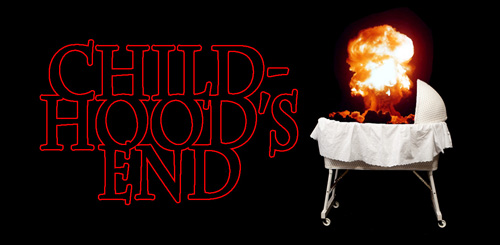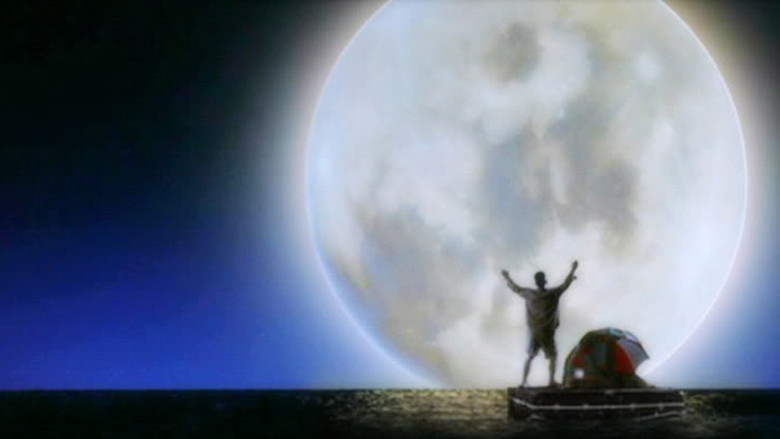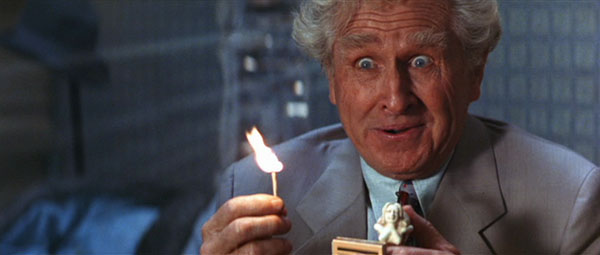
Oh, the cozy amber-tinted memories of youth. A simpler time of simpler tastes. As the cynical, crushing weight of adulthood often sends us nostalgically yearning to revisit the things we once held dear, we tend to find that those special things are not quite how we left them. Like a favorite climbing tree’s branches that we once had to leap for, now boringly coming up waist-high, the films we adored as children and tweens typically do not measure up the same now. Sometimes old favorites are best left to our memory. Yet now and then they miraculously hold up, or even prove to have hidden subtext we never realized. They say you can’t go home again, but I think it is high time that I tried.
 The Artifact: Joe Versus the Volcano (1990)
The Artifact: Joe Versus the Volcano (1990)
What Is It: Theatrical feature film.
The Backstory: John Patrick Shanley won a Pulitzer Prize, a Drama Desk Award, and a Tony for his play Doubt: A Parable, which he later adapted into the film Doubt, with Meryl Streep and Philip Seymour Hoffman. But in the 80’s he was just a sub-moderately successful playwright. So he wrote a screenplay, the quirky rom-com Moonstruck, which ended up starring Cher and Nic Cage, being a big hit, and winning Shanley an Academy Award for Best Original Screenplay. Now he was hot shit. This afforded him the opportunity to direct, and to attract two popular actors for another quirky rom-com. That project was Joe Versus the Volcano, and the two popular actors were Tom Hanks and Meg Ryan, pairing for the first of several times. Though not wildly expensive and though garnering a very positive review from Roger Ebert, the film was largely dismissed by critics and audiences alike and was considered something of a flop. This may explain why Shanely didn’t sit in the director’s chair again for nearly 20 years; his directing filmography contains two credits, Doubt and this.
The Memory: Joe Versus the Volcano played a seminal role in my creative/academic development, as concerns cinema. It was the first film in which I noticed subtextual themes while I was watching it. This made the film incredibly exciting to me. I knew movies had layers. I watched Siskel and Ebert and as much of the Academy Awards’ telecast as I could tolerate at my parents’ Oscar party every year. By 1990 I had a solid (if abstract) concept that there was more happening in some movies than was explicitly brought to my attention by the movies themselves. So JJV felt like a big deal to me. For this reason – despite not remembering many particulars of the plot – I have extremely strong memories of certain aspects of the film.

The fancy artistic subtext that I picked up on – my big breakthrough moment as a film buff – was a re-occurring image of a very specific jagged line, which if I am remembering correctly served as the path to Joe’s work [seen above], as a crack in the plaster on Joe’s apartment wall, as the lightning bolt that sinks Joe’s boat, and as the path leading up to the volcano. Story-wise all I really remember is that Joe works at a visually expressionistic and terrible job, and then for some reason he decides to go jump in a volcano. He gets a bunch of money (lottery?), which allows him to buy a bunch of fancy shit, including a set of water-tight suitcases. These suitcases come in handy when his boat sinks on the way to the volcano and he ties the suitcases together to make a raft. For whatever reason I vividly remember Joe retrieving a cordless radio from one of his suitcases and picking up The Del-Vikings 1956 doo-wop hit “Come Go with Me,” and then dancing around like a goon. I loved this scene and became obsessed enough with the song that I tracked it down and bought it on CD (much harder to do in those dark pre-Internet days). I remember that Meg Ryan played three characters. And I remember that the natives on the island with the volcano are obsessed with orange soda and that their outfits are decorated with a lot of empty orange soda cans.
That’s right, I remember more about the particulars of that jagged line than I do about the movie’s actual plot.

How Long Has It Been: 18 or 19 years.
The Reality: Wow, I can’t believe how entirely I forgot the basic concept of this film. Which is that Joe discovers he has a bizarre and fatal malady known as a “brain cloud,” and will die in a few months. Then an eccentric billionaire industrialist played by Lloyd Bridges offers Joe a bunch of money and a free trip to the tropics if he agrees to jump into a volcano. The purpose of this is to appease the island’s natives, the Waponis, and thus grant Bridges the exclusive rights to a mineral found only on the island; unobtainium or something. Joe has nothing to live for and decides to go out like a badass, so he accepts the crazy proposition.
Despite the pivotal role JVV had played in my youth, as so often happens in that awkward stage of late adolescence, I shunned the film when I found out that “people” thought the movie was “stupid.” Tragically, as also so often happens, as time went by I lost sight of precisely why I viewed JVV as stupid and began to just assume such was the accepted reality. Well, fuck my ass — to quote Tenacious D. While not brilliant by any means, JVV is a damn fun film, and above all else, it is interestingly weird. It is also one of the few films I can think of that qualifies as an “existential romantic comedy.”
Unsurprisingly the “subtext” of that re-occurring jagged line is so conspicuous that, well, even a little kid could notice it. Viewing now, as an adult, the film hits you over the head with its themes of existentialism versus destiny (ie, Joe versus that volcano; which actually proves to be more Man Vs Self than Man Vs Destiny). We get moments where a character asks Joe what is wrong with his shoe and Joe replies, “I’m losing my soul.” And the gimmick of Ryan playing various women in Joe’s life isn’t really saying as much as it seems like it should be. Joe tells the respective women that he feels like he has met them before, and has had this feeling all his life. But two of the characters are sisters, so their resemblance isn’t actually unusual in any way. And at the end of the film Joe really lays out the symbolism of that jagged line when he says his life has been a “long time coming here on a crooked road.” None of this adds up to anything other than vague romanticism; this isn’t provocative Eternal Sunshine-level depth. But it is fun. It’s generally poor form to quote another film critic’s review in your review of the same movie, but this isn’t a review, and I think Roger Ebert summed up JVV quite succinctly when he said: “It is not an entirely successful movie, but it is new and fresh and not shy of taking chances.”
JJV extroverted themes and ideas, combined with the stylized presentation of the film, not to mention the presence of a nightmarish corporation, reminded me a lot of The Hudsucker Proxy. Hanks and Tim Robbins easily could have starred with equal effectiveness in either film. JVV‘s flair is not quite as grandiose and ingenious as Proxy‘s (I like Shanley, but he’s no Coen Bros), but both films share a kinship. They both have a style-over-substance approach that I think turned a lot of people off, but for those who are into cinema for its own sake – or simply aren’t too snotty – there is a vibrancy to be found in JVV. Like Proxy, this film is light, funny and oddly clever.
But the film has a rocky first couple minutes. First off, we open with a dreadful white-boy-blues rendition of the country classic tune-of-woe “Sixteen Tons” as Joe arrives at the baroquely terrible factory where he works, which is just as expressionistically designed as I remembered. The scene is littered with a series of corny jokes in the form of signs bragging that the company is the “Home of the Rectal Probe” and other juvenile things (no wonder I loved this in 1990). But the moment the awful “Sixteen Tons” cover ends, things suddenly pick up. I love the art direction of Joe’s office, utilizing the soul-sucking color pallet of concrete and florescent lighting, and some slight forced-perspective set design to make things feel off. The scene also features the great Dan Hedaya, who perfectly sets the tone of Joe’s work-life with an inane and repetitive monologue. This:
..
What does it say about me that of Meg Ryan’s three characters in the film, I found DeDe, Joe’s neurotic inhaler-using coworker, the most attractive? I’m not sure how I feel about that.
Shanley surrounds Joe with a host of excellent supporting characters. It is a treat to see Robert Stack as Joe’s doctor, informing Joe that he is a hypochondriac, yet, ironically, if it had not been for Joe’s insistence that he be given so many tests they never would’ve discovered the symptomless brain cloud. Joe: “So I’m not sick? Except for this terminal disease?” Lloyd Bridges chews the scenery in his one and only scene with gluttonous amiable energy — frankly one of Bridges best performances. And Ossie Davis plays the small role of Joe’s limo driver who helps him spend his money, and starts Joe off on the right foot towards self-discovery: “I’m not hear to tell you who you are.” And the whole Waponi civilization is something straight out of Carl Barks by way of Mel Brooks. I love the look of the natives, constantly drinking their orange soda, and for utterly no reason Shanley gives them a bonkers backstory. Long, long ago and Roman ship carrying some Scots and some Jews got lost in a storm and wound up on the island. Their two defining characteristics are: they love orange soda and they have no sense of direction. Why this nonsense? I don’t know. Possibly just so Shanely could cast Abe Vigoda as the Chief; plus Nathan Lane as the other main speaking role. Abe Vigoda is hilarious as the Chief, I should add.
Hanks is Hanks, lovable and solid as always. Ryan of course has the showier role, or rather roles, pulling an Eddie Murphy minus the fat suits. Though the only character that proves outside her normal box of tricks is Angelica, a spoiled wannabe poet who looks after Joe in LA before he heads out to sea. Ryan plays Angelica with extreme hamminess, but it works for the ridiculous character Shanley has constructed:
Angelica: Would you like to hear one of my poems?
Joe: Sure.
Angelica: Long ago, the delicate tangles of his hair… covered the emptiness of my hand. (beat) Would you like to hear it again?
Joe: (confused) Ok.
Angelica: Long ago, the delicate tangles of his hair… covered the emptiness of my hand.

JVV‘s secret weapon is the dialogue. Which isn’t too surprising considering that Shanley is a Pulitzer Prize-winning playwright. He weaves from Moonstruck-esque flamboyant romance: “I bribed him to sing us a song that would drive us insane and make our hearts swell and burst.” To Coen Bros-esque heightened weirdness, like the luggage salesman who earnestly asks Joe, “Have you thought much about luggage, Mr Banks?” To sillier Mel Brooks-esque exchanges, like when Joe learns it is time to climb the volcano and he asks the island Chief, “Is there any ceremony or anything?” And the Chief apathetically replies, “No you just jump in.”
The film features so much music it is almost a musical, and indeed Shanley wrote a couple tunes for the film — one of which Hanks sings on a ukelele during the suitcase-raft section of the film. But the film does get a bit carried away sometimes, such as a pretty stupid musical montage in which Joe is fishing with Patricia (Ryan’s third and most important character) and catches a hammerhead shark. But when you’re aiming over the top like Shanley is, not everything is going to work. He does have some big stylistic flourishes that are either going to land for you or seem excessive, like that giant moon on the horizon shot pictured above (what is it with Shanley and the moon?).
This is a silly movie, especially considering it is existential and, you know, about a guy who is going to jump into a volcano because he is dying. There is really only one human moment in the whole film, which is a scene on the boat where Patricia talks with Joe about betraying her ideals by agreeing to carry Joe to the island (her father is Bridges, and she’d previously vowed never to work for him). Beyond this, there isn’t a lot of real relatable humanity on display. After his big spending spree in the city, Joe is forced to wine and dine and go to sleep alone. And he is lonely. Though this worked perfectly for the story (Joe also turns down an offer of sex from Angelica later), it didn’t ring very true. I’ve never gotten a prostitute before, but if I suddenly had limitless cash and only one night in the city before I embarked on a journey that was to end with me jumping into a fucking volcano… I think I might give it a go. Just sayin’. This is a total nitpick though.

Paradise Lost or Magic Reborn: Magic reborn. I wouldn’t say the film is so amazing that people need to seek it out, but those who might be thinking of revisiting it should definitely do so. Vintage Hanks. Vintage Ryan. Bridges hamming it up. Good times.
.
Previous Ruins Explored
The Ewok Adventure | The Care Bears Movie
Bedknobs and Broomsticks | The Land Before Time
Baby: Secret of the Lost Legend | Alice in Wonderland (TV)